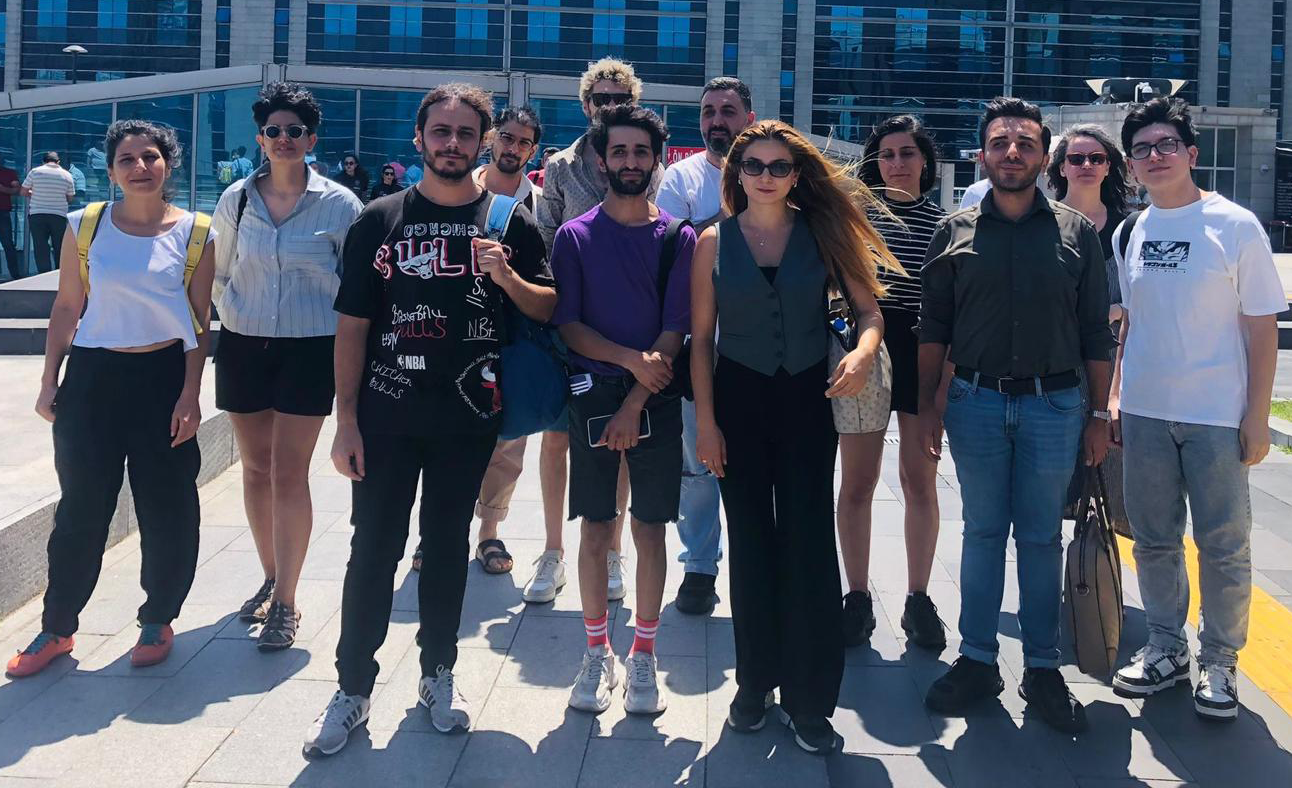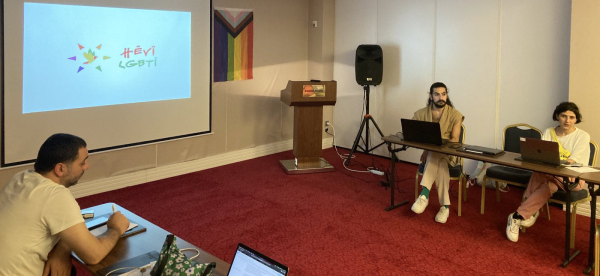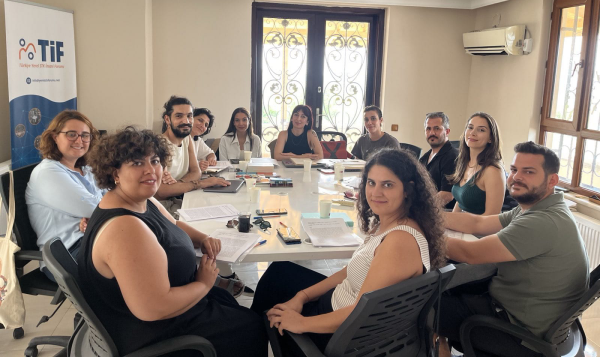
“Many of us have first-hand experience with marginalisation and displacement, which allows us to deeply empathise with the challenges faced by asylum seekers,” says Müzeyyen Araç. “We work closely with LGBTI+ refugees, providing a platform for them to share their stories and advocate for their rights.”
Araç is the General Coordinator and a founding member of Hevi LGBTI+ Association, which provides a supportive and safe space for the LGBTI+ community in Turkey. Initially targeting Kurdish LGBT+ people in Istanbul, the organisation then expanded its reach and now supports queer refugees arriving in the country, advocating for better protections and greater inclusion within Turkish society.
As activists, Hevi's founders have had to overcome double discrimination in their work due to their queer identity and their Kurdish origin. Despite these obstacles, they are determined to defend the rights of the most marginalised groups in Turkey. Hevi is the only LGBTI+ organisation in the country that provides peer counselling in five different languages. It now has 14 team members and 18 volunteers.

Müzeyyen launched Hevi with fellow human rights defenders in 2013, during the Gezi Park protests, which shook all of Turkey. The protests, which lasted several months and mobilised more than three million people across the country, were a response to Turkey’s democratic backsliding and an increased pressure by the government against fundamental rights.
While the protests started as peaceful sit-ins, they turned violent due to police brutality, with more than a dozen protesters killed, and more than 3,000 arrested. “A group of Kurdish LGBTI+ individuals came together to create a safe space for themselves and other marginalised communities,” says Müzeyyen. “Since then, we’ve prioritised diversity, embracing people from various ethnic and religious backgrounds.”
During this period, thousands of Syrian refugees also began to arrive in Turkey, and Hevi began to distribute information about their work in Arabic and Persian and reaching out to LGBTI+ asylum seekers directly.
The challenges faced by queer refugees in Turkey are considerable. As Müzeyyen puts it, “LGBTI+ refugees face serious safety threats. While international protection mandates safeguard migrants, LGBTI+ refugees often feel unprotected and experience widespread rights violations.”
One of the most important problems is access to health services. LGBTI+ refugees can only access free healthcare for one year after their arrival, but after that only those with work permits and those who have a legal status can access healthcare. “LGBTI+ refugees living with HIV face even greater challenges,” says Ameda Karakuzu, Programme Coordinator at Hevi. “If the person was not diagnosed in Turkey, but in their country of origin, they are not allowed free access to HIV treatment and medication here.”
There are other limitations that affect LGBTI+ refugees – such as the lack of state services in their native languages, low social inclusion, as well as an increasingly anti-gay rhetoric in Turkish society.
“Politics and social dynamics are very divisive,” Ameda explains. “In 2023, after we had our general elections, the government tried to mobilise the masses by targeting LGBTI+ people, and the opposition used anti-migrant language and narratives. LGBTI+ refugees were subjected to double discrimination due to their intersecting identities. Under these circumstances, the only way for refugees to protect themselves is social isolation, and we are trying to break that.”

Navigating social and political barriers in Turkey poses many challenges for Hevi – as the team has to deal with complex bureaucracy and even hostility from the state authorities toward queer asylum seekers.
"Revealing our identity as representatives of an LGBTI+ organisation frequently results in arbitrary treatment and a lack of support from officials. Sometimes, we need to rely on intermediaries just to advocate for LGBT+ people,” says Müzeyyen.
The legal framework in Turkey deepens these difficulties.
“Turkey’s lack of legal obligation to protect LGBTI+ refugees is a critical issue,” Ameda points out. “Due to Turkey's geographical reservation on the 1951 Geneva Convention, refugees are often labelled as conditional or secondary, leaving them in a limbo with limited rights and perpetual uncertainty, adding to the general insecurity over their future.”
To tackle that, Hevi is working on targeted reforms. It has prepared a policy document written by refugee activists. Thanks to EED's support, the team is expanding its work outside Istanbul, travelling to different cities across the country and holding meetings on awareness-raising for LGBTI+ refugees.
“We are trying to build a more inclusive civil society,” Ameda adds. “Our goal is always to give voice to the people we serve. We do not represent anyone, but instead, we try to create spaces where people can represent themselves.”
EED's support has allowed Hevi to to expand its reach and scope and enabled it to connect with key organisations like UNHCR, strengthening network links within the field of human rights and conducting inclusion workshops for various civil society organisations.
“Thanks to EED’s continued support, we can now offer 24/7, multilingual support in five languages to LGBTI+ refugees,” Müzeyyen says. “This expanded reach wouldn’t be possible without EED, which has been an invaluable partner throughout this journey.”
The Hevi team hopes to contribute to a positive transformation in Turkey where all communities – including refugees or other minorities – will be treated with dignity and respect. For now, it is focused on empowering its beneficiaries as well as mentoring and supporting them whenever needed.
“Seeing our beneficiaries join us as volunteers is incredibly heart-warming,” Ameda says. “It's a testament of the impact we make, and it motivates us to keep growing stronger together.”
“Sometimes we come across situations where, if we don’t act quickly, one of our advisees could be deported,” Müzeyyen adds. “In these moments, when we rescue an LGBTI+ refugee from the Repatriation Centre, this feels good.”
“I wish we could imagine a time when there would be no need for Hevi anymore,” they conclude.
This article reflects the views of the grantees featured and does not necessarily represent the official opinion of the EED.